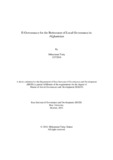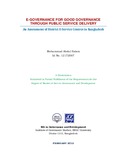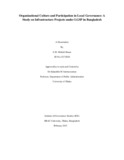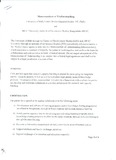| dc.contributor.advisor | Hoque, Shah Mohammad Sanaul | |
| dc.contributor.author | Tariq, Mohammad | |
| dc.date.accessioned | 2022-09-11T06:15:54Z | |
| dc.date.available | 2022-09-11T06:15:54Z | |
| dc.date.copyright | 2016 | |
| dc.date.issued | 2016-10 | |
| dc.identifier.other | ID 15272018 | |
| dc.identifier.uri | http://hdl.handle.net/10361/17192 | |
| dc.description | This thesis is submitted in partial fulfillment of the requirements for the degree of Masters of Arts in Governance and Development, 2016. | en_US |
| dc.description | Cataloged from PDF version of thesis report. | |
| dc.description | Includes bibliographical references (pages 55-58). | |
| dc.description.abstract | E-Government is widely recognized as a successful tool for service delivery in both developing and developed countries, and it is recognized as a good means to achieve good governance by all developed countries in general and developing countries like Afghanistan in particular. The importance and function of E-Government in improving and ensuring good governance in Afghanistan's local government, as well as the role of E-Government in delivering government services to the local and marginalized people in an efficient, easy, and effective manner, are examined in this paper.
The qualitative and quantitative research methodologies were both used in this study. Interviews and a self-administered questionnaire were used to collect data from random samples of Afghan local government personnel.
The components in this study were created by combining measurement scales from previous research and the literature. MS Excel and the SPSS Program were used to examine the data.
To find out how much people believe in E-Governance positive impacts on local governance Afghanistan the good governance achievement through E-Governance first the employees, were assessed about their knowledge of E-Governance and they were asked about the available basic facilities which will be important for E-Governance successful implementation, second they were asked how E-Government affects good governance, including the reduction of corruption, the intensity of clarity, the efficiency of service, the level of convenience, the extent of accessibility, and the level of interaction, and how good governance is measured by accountability, transparency, responsiveness, the rule of law, effectiveness, and participation. Employees of local government agencies have fundamental knowledge and facilities for implementing E-Government, according to this survey.
Furthermore, the study's findings revealed that employees believe that E-Governance efficiently and effectively delivers public services, and that the delivery of e-services has a positive impact on citizen satisfaction, and that the E-Governance initiative leads to good governance promises, subject to hypothesis validation. Understanding the current state of E-Governance in Afghanistan can assist policymakers and implementers in ensuring that public services are delivered effectively.
This study and its findings have some limitations, but they also point to areas where more research should be conducted in order to achieve good governance through E-Governance in local governance agencies. | en_US |
| dc.description.statementofresponsibility | Mohammad Tariq | |
| dc.format.extent | 84 pages | |
| dc.language.iso | en | en_US |
| dc.publisher | Brac University | en_US |
| dc.rights | Brac University theses are protected by copyright. They may be viewed from this source for any purpose, but reproduction or distribution in any format is prohibited without written permission. | |
| dc.subject | E-Government | en_US |
| dc.subject | Local governance | en_US |
| dc.subject | Afghanistan | en_US |
| dc.subject | Good governance | en_US |
| dc.subject | E-service | en_US |
| dc.subject.lcsh | Internet in public administration | |
| dc.subject.lcsh | Politics and government | |
| dc.subject.lcsh | Local government | |
| dc.title | E-governance for the betterment of local governance in Afghanistan | en_US |
| dc.type | Thesis | en_US |
| dc.contributor.department | Brac Institute of Governance and Development, Brac University | |
| dc.description.degree | M. Governance and Development | |




